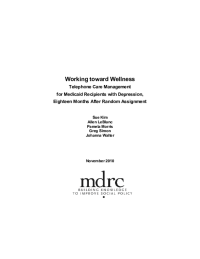Working toward Wellness
Telephone Care Management for Medicaid Recipients with Depression, Eighteen Months After Random Assignment
Although many public assistance recipients suffer from depression, few receive consistent treatment. This report on a telephonic care management program in Rhode Island that tried to encourage depressed parents who were receiving Medicaid to seek treatment from a mental health professional presents results through 18 months — six months following a one-year intervention. Called “Working toward Wellness,” the program represents one of four strategies being studied in the Enhanced Services for the Hard-to-Employ Demonstration and Evaluation to improve employment for low-income parents who face serious barriers to employment. The project is sponsored by the Administration for Children and Families and the Office of the Assistant Secretary for Planning and Evaluation in the U.S. Department of Health and Human Services, with additional funding from the Department of Labor.
In Working toward Wellness, master’s-level clinicians (“care managers”) telephoned the study participants in the program group to encourage them to seek treatment, to make sure that they were complying with treatment, and to provide telephonic counseling. The effects of the program are being studied by examining 499 depressed Medicaid recipients with children, who were randomly assigned to the program group or the control group from November 2004 to October 2006. Participants were given a list of mental health professionals in the community from whom they could receive treatment.
Key Findings
- Care managers effectively engaged people with depression via telephone. Overall, 91 percent of the program group members had at least one discussion with a care manager, and the care managers averaged about nine contacts per client over the yearlong intervention.
- There were significant barriers to in-person treatment within the target population. Participants typically faced many ongoing and interrelated life stressors, including multiple health problems and child care and other caregiving responsibilities. The context of poverty shaped their lives in ways that influenced their well-being and ability to seek treatment.
- The program increased the use of mental health services. The program group was more likely than the control group to see psychiatrists, psychologists, and primary care physicians. These effects were largest in the program’s first months but faded over time. Program group members made 1.6 times as many visits to mental health professionals, but there was no overall difference between the groups in filling prescriptions for antidepressant medications. However, there was an increase in filling prescriptions for other psychotherapeutic medications, primarily antianxiety medicines.
- The program did not significantly reduce depression, on average, but it did significantly change the distribution of depression severity, reducing the number of people who suffered from very severe depression. Program and control group members had similar average depression scores at 18 months following random assignment, but there were shifts in the distribution of depression severity. In particular, individuals in the program group were less likely than those in the control group to be very severely depressed at the 18-month follow-up.






